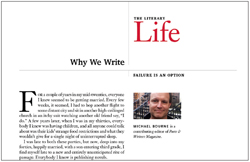Poets & Writers Magazine welcomes letters from its readers. Please post a comment on select articles at www.pw.org/magazine, e-mail editor@pw.org, or write to Editor, Poets & Writers Magazine, 90 Broad Street, Suite 2100, New York, NY 10004. Letters accepted for publication may be edited for clarity and length.
 Driving the Point Home
Driving the Point Home
I want to say how much I appreciated Michael Bourne’s article “Why We Write: Failure Is an Option” (September/October 2015). I so identified with his realization that he had viewed writing as an indulgence, as frivolity, when one could easily make a living with a less subjective vocation. Growing up in the Midwest, in a family of staunchly practical Germans and Scots, some of whom spent lifetimes working jobs they disliked in order to support their families, I felt a pull to succeed in particular ways. It can be difficult to develop a conception of success that doesn’t involve a certain income, a certain type of house, and, since my family is from the Detroit area, a certain level of car ownership. I enjoy great support and encouragement from my family when it comes to my writing, but that doesn’t stop that internal nagging voice that says I am wasting time that could be better spent on something “productive.” Reading Bourne’s article was a welcome step back from my doubts as I prepare to query agents with my third manuscript, and brace myself for more rejection. Thank you for your top-notch magazine and for the wisdom and passion you pour into writers’ lives.
Erin Bartels
Lansing, Michigan
Michael Bourne nailed it. Square to the wall. This is one of the most important articles I’ve ever read in Poets & Writers. Thanks.
Mike McDermott
Reston, Virginia
Michael Bourne’s heartfelt essay in @poetswritersinc was just what I needed. Thank you!
Anika Fajardo
@anikawriter
The Linguistics of Lafayette
Jeremiah Chamberlin’s article “Know Thyself: The Linguistics of Place” (September/October 2015) moved me. I grew up in the suburbs of Chicago and had no experience with the rural until I moved to Indiana so my husband could pursue his graduate studies. Even though Lafayette is a city, it is close enough to farmland that my closest friends were people who had grown up on farms. My husband and I were awed by how capable they were. We called them doers. In the world we came from, only fictional characters milked cows or built something where nothing was before. Yet these friends lived in houses their relatives had physically built. They canned and pickled. They hunted deer and ate venison. They didn’t call people when their septic tanks backed up—they literally took care of their own shit. When I gave birth, they took turns bringing me dinner every night. When I miscarried my next baby—and then the one after—they came to just sit with me. It comforted me to know that these friends would not be scared off by loss or death. I thought of these friends as I read “Know Thyself.” Although they never took a college-level literature class, they most definitely did not lack access to their emotional landscape, nor did they suffer from lack of eloquence. Chamberlin articulated something I only vaguely understood. I am more aware as a reader, a writer, and a person because of it. Thank you.
Mika Yamamoto
Midland, Michigan






